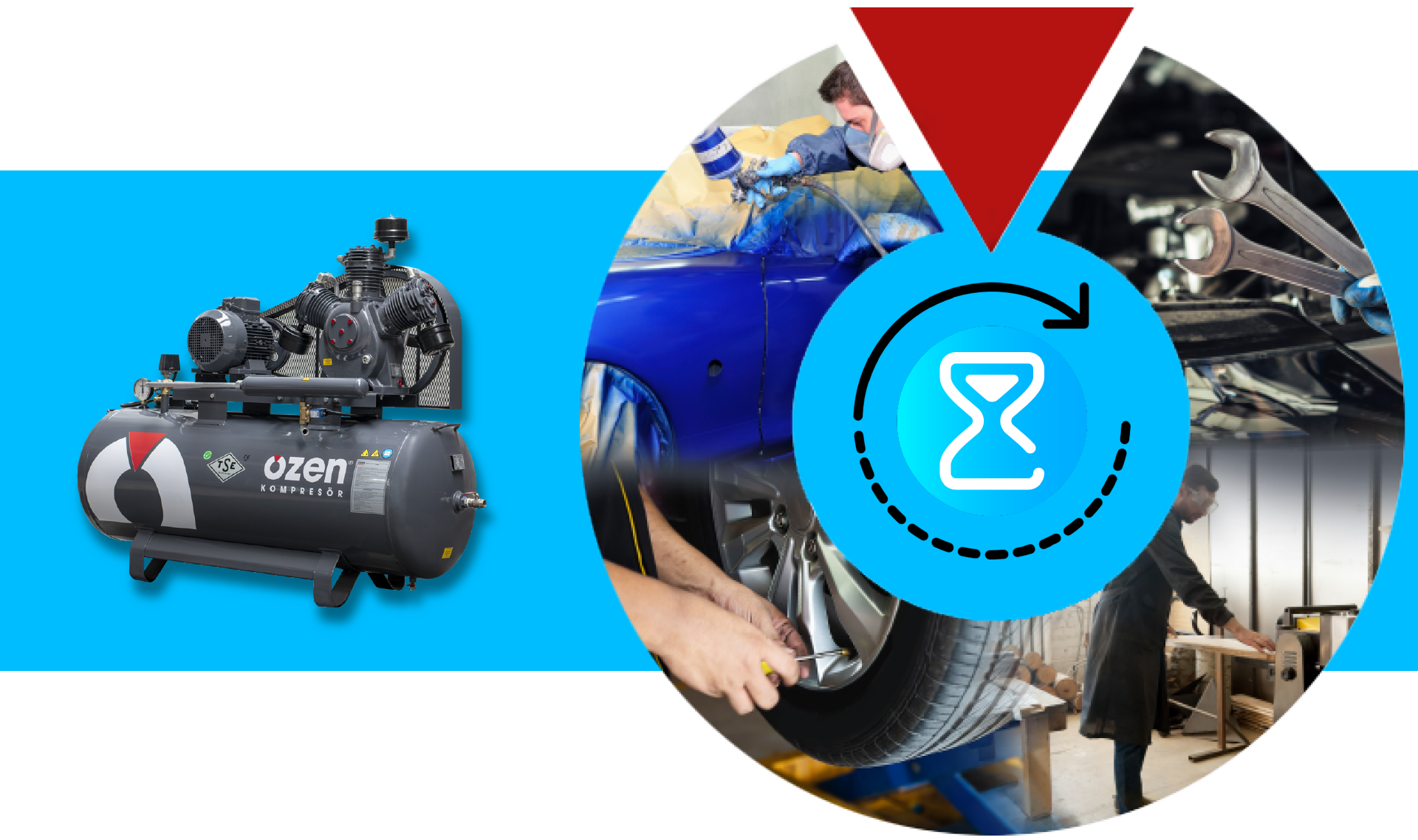How Do Piston Compressors Have Longer Life?
16 May 2022, Mon

The operating principle of compressors is explained by the laws of thermodynamics. The physical laws also tell how the compressor compresses the gases. According to the formula of the ideal gas law, as the volume of the gas decreases, the pressure increases proportionally. High pressure compressed air provides the required force to be obtained. The types of positive displacement compressors that are used to convert gas into smaller volumes include screw compressors and piston compressors. The screw compressor types operate with the help of rotor. Male and female rotors rotate in opposite directions and reduce its volume by trapping the air between them. The risk of mechanical instability is reduced since there is no valve system for rotary screw compressors. The piston air compressor is the oldest type of compressor. It operates with a valve system equipped with two discs. As the piston moves down, air enters and starts to get compressed in the cylinder and gains pressure. The valve systems are used for regulating the inlet and outlet of air.
How Does a Piston Compressor Operate?
The piston compressors are the oldest and most widely used models of the positive displacement compressor class. The air is compressed by being taken into a closed volume and pushed towards the high pressure side. Here, a force is used to increase the air pressure and move the air to the high pressure side. The element that provides this force is the piston. The piston that moves in the cylinder is constantly displaced and compresses the air. This displacement process is called as translation.
The piston compressors can be air-cooled, water-cooled. They are also divided into oily and oil-free types. There are models developed in such a way that pressure and capacity selection can be performed. The valves are also opened or closed according to the pressure inside the cylinder. The piston compressors have low purchasing costs and are very advantageous since they can be moved easily. The piston compressors have standard specifications. Their designs are quite simple and stable. The availability of spare parts is quite much. The suction valve system is designed to minimize the clearance volume. The bedding system has a needle roller bearing structure that minimizes the mechanical friction.
What are Compressor Failures?
The compressors that provide time and energy saving advantage by providing compressed air may have some failures. It is important to perform maintenance in order to prevent these failures from occurring. The secret of a long-lasting compressor is in its regular maintenance. The compressor failures that may occur particularly in piston models are as follows:
Fluid carryover: It means that the refrigerant returns to the compressor in operating state.
- Flooded launch: It means the foaming of the oil during operation due to the migration of refrigerant vapour into the oil in the compressor that is not operating.
- Fluid knocking: It is the entering of excessive amount of refrigerant or oil into the cylinder in the operating compressor.
- High discharge line temperature: When the compressor transmits the refrigerant vapour to the discharge line, this vapour temperature and the condensation temperature are considered as equal. Having steam temperature higher than the condensing temperature causes a failure.
- Oil losses: The oil is used in order to prevent the mechanical parts of the compressor from rubbing. This lubrication should provide a complete sealing, particularly between the piston and its bearing. However, as the piston moves back and forth, if there is no sealing, then some of the vapour will leak back into the compressor crankcase and causes degradation.
Maintenance of Piston Compressor
In order to enable the compressors have longer life, it is important to perform their maintenance periodically. In all maintenances, it is necessary to initially cut off all electricity from the main switch and make sure that all compressed air is discharged. While the compressor is operating, its covers are not opened and no parts are moved.
There are daily and weekly maintenance periods available for the maintenance of the compressor. Daily maintenance includes some checks to be carried out before operating the compressor. Checking the oil level is the most important phase. It is important to add oil if the level is low. However, the oil addition frequency and the amount of oil must be checked, if it seems like there is an excess, then this should be considered as a problem in the machine and the service should be called.
The drainage of the water that is accumulated in the oil tank is at the top of the weekly maintenance recommendations for long-life piston compressors. Following the checking of the oil filter and oil level, the radiator cores, dust and suction filter are cleaned with compressed air. If required, the spare parts and other materials belonging to the compressor are also cleaned and stored. The compressors operate 24/7 in most applications. For this reason, it is also important to perform continuous maintenance and checks. The continuous maintenance of piston compressors, particularly cooling systems, makes the compressor ready for a much longer use.
